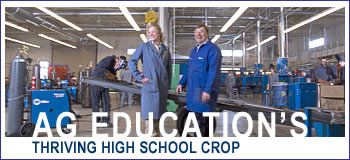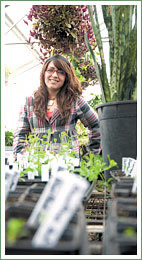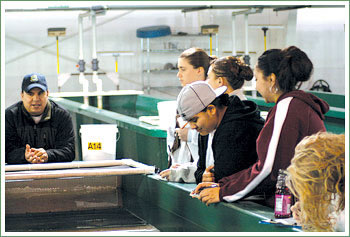Agricultural education’s thriving high school crop in Idaho
With fewer direct jobs on the farm these days,
agricultural education might seem
an anachronism in modern schools.
The reverse is true.
by BILL LOFTUS
MERIDIAN HIGH SCHOOL’S ANNIE COPE is one of the school’s marching band’s drum majors. And she’s active in agricultural education classes because she loves the subjects. This fall she’ll attend the University of Idaho.
Lapwai High School students Memory Abe and Nikesa Ellenwood dare each other to stick a finger in a large tank holding eel-like lampreys, then laugh when the fish react. In March they toured the Nez Perce Tribe’s $16 million high tech hatchery at Cherry Lane east of Lewiston along the Clearwater River. It was for their aquaculture class, part of Lapwai High’s agricultural education.

Jessica Smith, left, a UI CALS senior in agricultural and extension education, student teaches at Meridian’s new Professional-Technical Center magnet high school alongside UI alum and veteran teacher Steve Wilder, right. Students learn to weld in state-of-the-art shop furnished by Miller Electric. Photo by PAM BENHAM
These three young women represent the sustained and evolving popularity of high school agricultural education in Idaho.
Meridian School District last fall opened a new professional-technical center to accommodate interest in ag education classes, enrolling some 700 of the 2,000 high school students. When Steve Wilder attended high school in Meridian in the 1970s, ag education helped him decide
on a career. Nearly 30 years later, Wilder teaches ag education at the new $10 million magnet school.
In western Ada County, Meridian’s high school serves one of Idaho’s fastest growing communities where farm fields sprout homes seemingly overnight. Production agriculture has yielded to other livelihoods, yet ag education remains popular.
NEW: Ag ed high schoolers will earn UI credit
The University of Idaho’s College of Agricultural and Life Sciences (CALS) plans to tap into that enthusiasm and expand opportunities for Idaho high school students to advance their educations by offering college credits for selected high school ag ed classes.
The college’s Agricultural and Extension Education (AEE) Department is networking with high school teachers to establish dual high school and college credits. John Foltz, CALS associate dean and director of academic programs, sees the proposed dual credit program as reflecting the quality of both high school ag ed classes and FFA career development events.
“Part of the reason I’m high on it is because for a number of years I helped write the state level exam for FFA’s Farm Business Management career development event. The agricultural business curriculum fits very well with what we want students to learn in Ag Econ 101,”
Foltz said. “This is a way we can offer college credit throughout the state,” he added.
Teachers this summer will attend a workshop on the Moscow campus to prepare for dual enrollment.
CALS ties to Idaho ag teachers run deep
Ties linking Idaho high school educators and CALS’ AEE department run deep. Meridian’s Wilder earned a bachelor’s degree in agricultural education at Idaho, then taught in southwestern Idaho’s Marsing. In his year there, he taught Joe Blackstock, who, like Wilder, decided to make agricultural education a career.
Blackstock earned a bachelor’s from Idaho in 1987 when Wilder earned his master’s from the university—both in agricultural education. Blackstock has taught for 19 years next door to Meridian at Kuna, another Idaho school district where ag education classes are highly popular.
With fewer direct jobs on the farm these days, agricultural education might seem an anachronism in modern schools. The reverse is true. Drum major Annie Cope took ag education classes because they address her interests. “I took the intro to livestock class because I really like animals,” she said.
She’s considering a career in agriculture because she is people oriented. Enrolling at the University of Idaho during Vandal Friday in March, Cope plans to study music and agricultural education this fall.
FFA’s link to ag education in Idaho
Another strong incentive drawing high school students to agricultural education programs is FFA. Founded as the Future Farmers of America 80 years ago, the national organization broadened its goals to include more than production agriculture in 1988 and changed its name to National FFA Organization.

In Meridian High’s greenhouse,
Annie Cope works with plants.
She’s among hundreds of Idaho high school
students electing ag ed classes because
of the leadership training and career development
opportunities FFA and the classes offer.
Photo by PAM BENHAM
The opportunities FFA offers—to build leadership and public speaking skills and join in career development experiences throughout the state and nation—give students a chance to belong and grow their skills.
“Mr. Wilder was an awesome teacher, and I joined FFA,” remembers Cope. “I’ve seen how it can help people come out of their shells, and I’d like to be a part of that.” As secretary of the Meridian FFA chapter, Cope attended the National Convention at Indianapolis in late October—one of 53,631 students.
“Many of these kids are here [FFA and ag ed classes] for career exploration,” Wilder said.
“We kind of gather kids like a stone gathers moss.” Agricultural education offers a rock- solid educational foundation that emphasizes the practical while opening the door to a wide array of career possibilities.
Twins Liz and Stew Russell grew up on a dairy farm, graduated from Emmett High School, and completed their freshman year at the University of Idaho this spring. Both enjoyed the camaraderie of FFA in high school.
That and the friendly student focus of the college’s agricultural and extension education faculty helped them choose majors in CALS.
Also, their father and uncles were UI alumni.
Liz wants to earn a degree in ag education and teach it in high school. Stew, studying agricultural science and technology, hopes to return as the third generation running the family dairy farm.
Ag ed: traditional and high tech
Modern high school agricultural education classes have metamorphosed to track the times. That hasn’t meant abandoning traditional strengths; it has meant expanding to include new disciplines and technologies.
Devin Boyer is in her fourth year teaching agricultural education at Lapwai High School. The Nez Perce Tribe’s traditions and strengths guide her class offerings. Animal science classes at Lapwai include wildlife biology, wildlife management, and aquaculture. Her horticulture class focuses on the restoration of native plants the tribe values for food and medicine.

Resting on a tank full of salmon fry, Aaron Penney, left, assistant manager of the Nez Perce Tribe’s Cherry Lane salmon hatchery, shows the $16 million hatchery to Lapwai High School agricultural education teacher Devin Boyer, to his left, and her aquaculture class. Nez Perce youth are encouraged to intern at the hatchery during summers.
Photo by BILL LOFTUS
Aaron Penney, assistant hatchery manager, led her aquaculture class on a tour of the Nez Perce Tribal Hatchery. One tribe member who pursued a college education in fisheries, Penney is a key member of the fisheries department. The tribe encourages high school students to work as summer fisheries interns, Penney said.
In Lapwai and elsewhere, career preparation is an ag ed cornerstone. At Meridian, for example, Miller Electric, one of the nation’s top welding equipment manufacturers, recognized the quality of the school’s program by agreeing to supply it with equipment for students’ use. The company has forged ties with college=level technical education programs, but Meridian has the only high school in the nation so chosen.
Most Idaho agricultural education teachers are UI alums
The culture of agricultural education in Idaho is tight-knit. Lou Riesenberg, a 30-year veteran of the university faculty, heads the Agricultural and Extension Education Department.
His department has trained more than 80 percent of the high school ag ed teachers now in Idaho.
Those teachers are the main reason ag ed flourishes in Idaho. Riesenberg lives for the moment when a student realizes the joy that results from helping someone else learn. He points out that ag ed teachers also have a major advantage over colleagues in school because, “their classes are electives. Students are there because they want to be, and that makes a huge difference.”
CALS alumna Allison Touchstone, agricultural science and technology program manager for the Idaho Division of Professional-Technical Education, sees the appeal of high school ag ed reflecting the nature of Idaho agriculture itself: “It’s popular because agriculture offers such a
wide range of opportunities.”
Student interest is greatest when high school programs integrate ag ed classes, FFA, and supervised agricultural work experiences. “When a program integrates all three, students
get the most well-rounded, successful education,” Touchstone added.
Contact Lou Riesenberg at lriesenb@uidaho.edu.
|